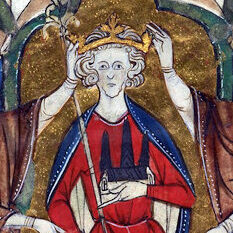1239

True to character, Henry’s break with Simon was abrupt and unseemly. He waited for the occasion of the queen’s churching – her offer of thanks for a safe childbirth – to lash out at the earl of Leicester, accusing him of owing another of his wife’s uncles a huge sum of money and offering him, the king, as security. Henry was so caught up in his anger that even charged his brother-in-law, in front of the assembled guests, with having seduced his sister, and that was the only reason why he consented to their secret wedding. Stunned and humiliated, Simon and Eleanor left forthwith, but Henry wasn’t through. He quickly had them turned out of their lodgings, then went a step further and ordered them locked up in the Tower of London. Fortunately the cooler head of Richard intervened and the unhappy couple was allowed to leave the country and settle in France.

There is no mention of what Queen Eleanor thought about her husband’s intemperate outburst during what supposed to be her day to shine. She seems to have been on good terms with her sister-in-law Eleanor and would remain so until the inevitable armed conflict wrenched the two families apart. She was probably unaware that her uncle, Thomas of Savoy, had craftily maneuvered to acquire the debt owed by Simon through the offices of the papacy. To make matters worse, this Thomas had married one of the rich widows Simon had set his sights on after coming into his dilapidated estates. Whether the widow felt jilted by de Montfort and was now only too happy to see him squirm in public remains an open question, but Eleanor no doubt felt pressure to side with another of her freeloading uncles.
For a man full of pride and ambition, it was mortifying for Simon to be berated in front of the assembled dignitaries. The situation with the debt was embarrassing enough, but the accusation that he bedded the king’s sister only confirmed him in the eyes of the native nobility as another self-seeking foreigner. And Henry leveled one more charge for good measure: he had bribed the pope into blessing his marriage with Eleanor. The king apparently forgot about all the money he gave him for his trip to Rome, not to mention writing a letter of introduction for his new brother-in-law (which neglected the part about the seduction). The chronicles state that Simon said nothing to the king’s shrill denunciation of him, merely that he turned and walked away. Their relationship would be mended within a year, but from then on Henry got as good as he gave.
For the historian inclined to see the development of parliament in the seediest, shallowest of terms, Henry’s condemnation of Simon’s character is a good place to start. The king had welcomed the young man into his service, helped him recover his family’s dominions, married him to his sister despite the expected outrage, and here he had the audacity to put Henry down as security for a loan without his knowledge. It was unforgivable presumptuousness on de Montfort’s part and his enemies at court, suspicious and envious of his meteoric rise, made sure Henry saw it that way. A tax was levied on Simon’s estates to meet his debts and the king sang high praises of Uncle Thomas in a letter to the papacy about the matter. He wisely left out his charges about Simon bribing the pope.
Whether Henry realized it or not, he also insulted his beloved sister when he accused Simon of seducing her. She had failed to protect her chastity from the advances of this swaggering Frenchman. Simon’s inability to publicly defend his wife’s honor was galling for a man who grew up in the land of chivalry (ravaged, admittedly, by his fanatical father) but no less so for impetuous and headstrong Eleanor. Whatever transpired between the lovers, the court believed that Eleanor had dropped her guard because the king implied it. She had always been Henry’s favorite and to lash out at her in a tantrum over money was going to cost him dearly, even if it meant derailing a future peace agreement with France.